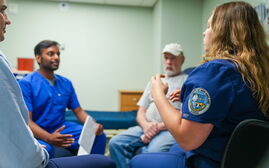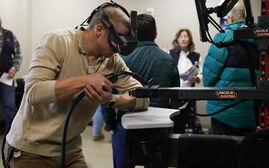UNE president testifies before Senate on how to combat shortage of health care workers
 Courtesy / University of New England
James Herbert, president of the University of New England, testified before a U.S. Senate committee on how to address the labor shortage in the health care industry.
Courtesy / University of New England
James Herbert, president of the University of New England, testified before a U.S. Senate committee on how to address the labor shortage in the health care industry.
The president of the University of New England offered a range of solutions to a U.S. Senate committee this week that would address the shortage of health care workers.
Changes in educational systems, additional incentives and greater efforts to foster diversity were among the ideas James Herbert presented in testimony before the Senate committee on Health, Education, Labor and Pensions (HELP) and a related subcommittee this week in Washington, D.C.
Herbert, who has been the UNE president since 2017, was introduced by U.S. Sen. Susan Collins, R-Maine, at a Congressional hearing titled, “Examining Health Care Workforce Shortages: Where Do We Go From Here?”
“Successfully addressing America’s health care workforce crisis will require not merely acting on each of these individual initiatives in isolation but by seamlessly integrating them,” Herbert said. “Although strategic investment of resources will be required, much of the work we confront reflects cultural changes that will require strong leadership; a willingness to innovate; and coordinated partnership between academia, government, industry, and the nonprofit sector.”
The American Hospital Association estimates that by 2033 the U.S. will have a shortage of 124,000 physicians and will need to hire 200,000 nurses per year to meet demand. The Association of American Medical Colleges has said the U.S. may lose as many as 55,200 primary care physicians by that time.
6 strategies
Herbert offered six potential strategies (and the following quotes from his presentation):
- Increase the number of doctors, nurses, and other health care professionals we educate by expanding partnerships between universities and community health care settings to develop additional training opportunities, revise out-of-date policies, provide targeted one-time adjustments to expand health care training infrastructure, and develop strategic scholarship and loan-repayment programs.
- Intentionally recruit more students who look like the communities we need to serve, as individuals from underrepresented groups are more likely to seek out practitioners who share their identities and background.
- Use a variety of tools to encourage health care providers to practice in underserved areas, including rural, tribal and medically underserved urban communities.
- Leverage the power of technology, including telehealth and digital medicine, to reach underserved communities and integrate robust telehealth training for all of our health profession students in close partnership with our various training sites.
- Modify state-level regulations to allow health professionals to practice at the top of their scope.
- Fundamentally change the prevailing educational model by encouraging accrediting bodies to allow training programs to be more creative and flexible and promoting Interprofessional Education (IPE) training models to break down traditional health care training and practice silos.
UNE medical professions
The University of New England, which has campuses in Biddeford and Portland, has Maine's only medical college and only dental college, as well as a range of health care degree programs.
UNE is in the process of consolidating its medical campus in Portland and in November broke ground on the $93 million Harold and Bibby Alfond Center for Health Sciences, which will be 110,000 square feet and be completed in time for the 2024-25 school year.
The project will relocate the university's College of Osteopathic Medicine from Biddeford, creating an integrated health sciences campus in a custom-built, state-of-the-art facility in Portland.
The move consolidates all health professions programs on the Portland campus — including the nursing program, dental school, pharmacy school, occupational therapy and related professional training, now with the incoming College of Osteopathic Medicine.














0 Comments